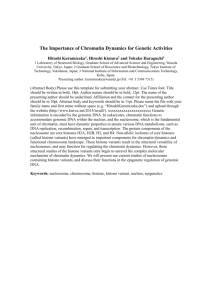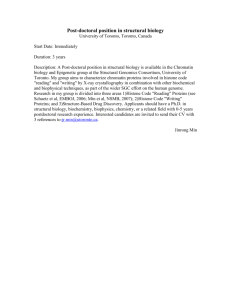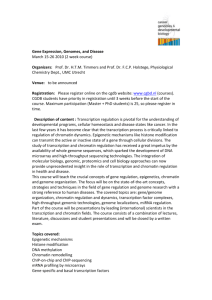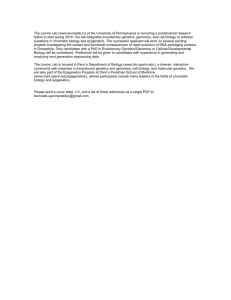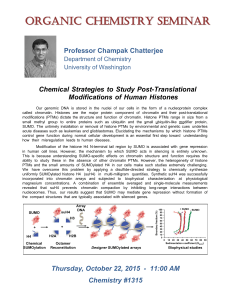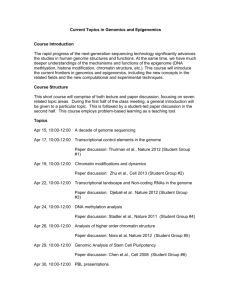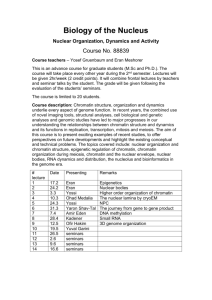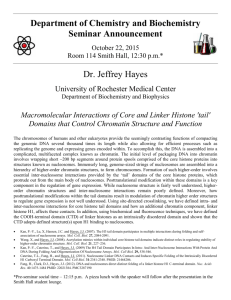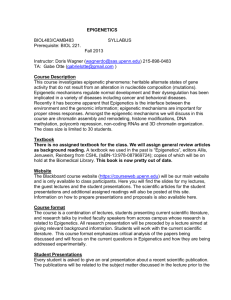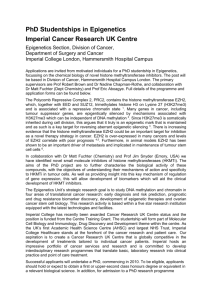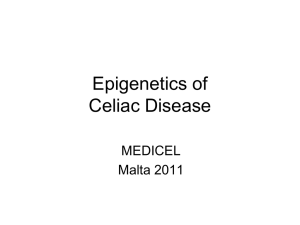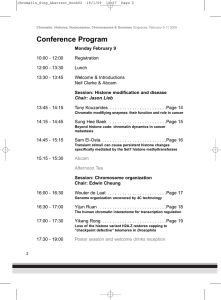Additional file 1 - Epigenetics & Chromatin
advertisement
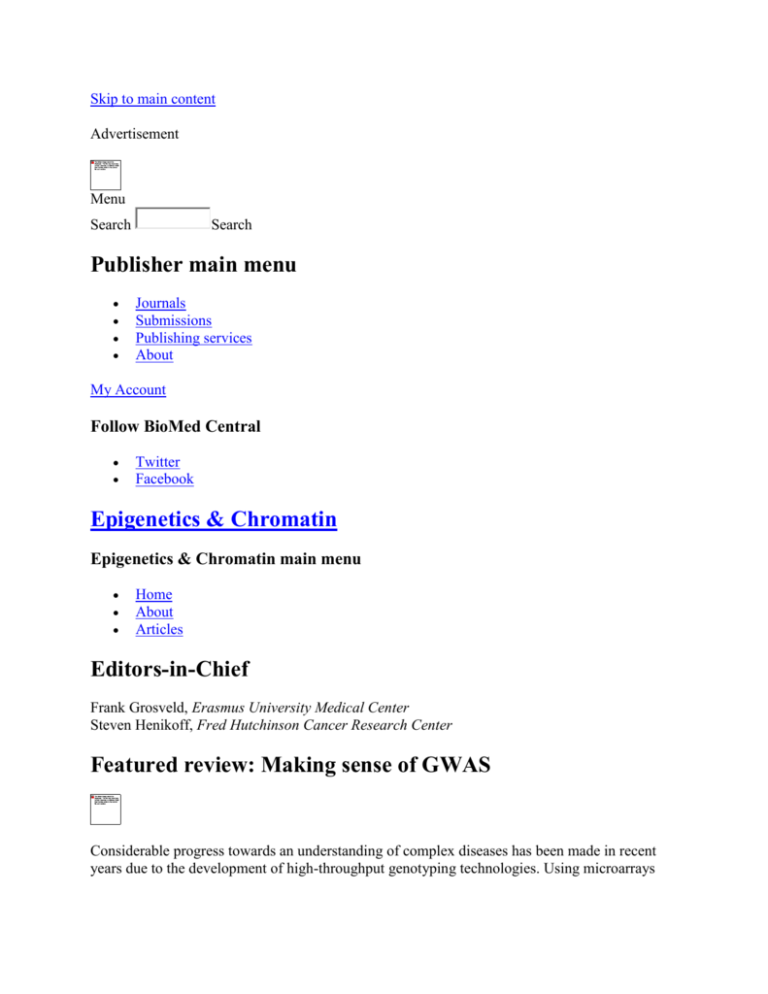
Skip to main content Advertisement Menu Search Search Publisher main menu Journals Submissions Publishing services About My Account Follow BioMed Central Twitter Facebook Epigenetics & Chromatin Epigenetics & Chromatin main menu Home About Articles Editors-in-Chief Frank Grosveld, Erasmus University Medical Center Steven Henikoff, Fred Hutchinson Cancer Research Center Featured review: Making sense of GWAS Considerable progress towards an understanding of complex diseases has been made in recent years due to the development of high-throughput genotyping technologies. Using microarrays that contain millions of single-nucleotide polymorphisms (SNPs), Genome Wide Association Studies (GWASs) have identified SNPs that are associated with many complex diseases or traits. Read More Articles Recent Most accessed Recent articles Recent articles RSS 1. Research The histone demethylase dKDM5/LID interacts with the SIN3 histone deacetylase complex and shares functional similarities with SIN3 Ambikai Gajan, Valerie L. Barnes, Mengying Liu, Nirmalya Saha and Lori A. Pile Published on: 3 February 2016 2. Research Histone H3.5 forms an unstable nucleosome and accumulates around transcription start sites in human testis Takashi Urahama, Akihito Harada, Kazumitsu Maehara, Naoki Horikoshi, Koichi Sato, Yuko Sato, Koji Shiraishi, Norihiro Sugino, Akihisa Osakabe, Hiroaki Tachiwana, Wataru Kagawa, Hiroshi Kimura, Yasuyuki Ohkawa and Hitoshi Kurumizaka Published on: 15 January 2016 3. Research A transgenerational role of the germline nuclear RNAi pathway in repressing heat stress-induced transcriptional activation in C. elegans Julie Zhouli Ni, Natallia Kalinava, Esteban Chen, Alex Huang, Thi Trinh and Sam Guoping Gu Published on: 15 January 2016 4. Research Roles of cofactors and chromatin accessibility in Hox protein target specificity Ching Yew Beh, Sherif El-Sharnouby, Aikaterini Chatzipli, Steven Russell, Siew Woh Choo and Robert White Published on: 8 January 2016 5. Review Making sense of GWAS: using epigenomics and genome engineering to understand the functional relevance of SNPs in non-coding regions of the human genome Yu Gyoung Tak and Peggy J. Farnham Published on: 30 December 2015 View all articles Most accessed articles Most accessed articles RSS 1. Review Chromatin accessibility: a window into the genome Maria Tsompana and Michael J Buck Published on: 20 November 2014 2. Review Constitutive heterochromatin formation and transcription in mammals Nehmé Saksouk, Elisabeth Simboeck and Jérôme Déjardin Published on: 15 January 2015 3. Research Additional annotation enhances potential for biologically-relevant analysis of the Illumina Infinium HumanMethylation450 BeadChip array E Magda Price, Allison M Cotton, Lucia L Lam, Pau Farré, Eldon Emberly, Carolyn J Brown, Wendy P Robinson and Michael S Kobor Published on: 3 March 2013 4. Review Proteomic characterization of novel histone post-translational modifications Anna M Arnaudo and Benjamin A Garcia Published on: 1 August 2013 5. Methodology A quantitative atlas of histone modification signatures from human cancer cells Gary LeRoy, Peter A DiMaggio, Eric Y Chan, Barry M Zee, M Andres Blanco, Barbara Bryant, Ian Z Flaniken, Sherry Liu, Yibin Kang, Patrick Trojer and Benjamin A Garcia Published on: 5 July 2013 View all articles Aims and scope Epigenetics & Chromatin is a peer-reviewed, open access journal that publishes research, and reviews, providing novel insights into epigenetic inheritance and chromatin-based interactions. The journal aims to understand how gene and chromosomal elements are regulated and their activities maintained during processes such as cell division, differentiation and environmental alteration. Efficient peer review Rapid: our Editors-in-Chief maintain an average time from submission to a first decision of 21 days. Expedited: we recognise that scientifically sound, high quality manuscripts are often turned away from broad-scope "high-impact" journals based on the issue of "general interest." As a specialist journal, Epigenetics & Chromatin will consider rapid publication of such manuscripts if they are submitted together with the original peer reviewer reports, letter of rejection, and a brief rebuttal. Journal Authority Factor = 111.5 The Journal Authority Factor (JAF) is the average h-index of a journal’s senior editors. The JAF thus complements the Impact Factor by providing a measure of the experience of journal editors as practicing scientists and authors. All manuscripts submitted to Epigenetics & Chromatin are evaluated by the Editors-in-Chief, who also recommend reviewers, evaluate reviews and make all decisions regarding acceptance, revision or rejection. Our JAF of 111.5 compares favorably with that of academic society journals, such as PNAS (59.9), and professionally edited journals, such as Nature (6.5). Tweets Submit a manuscript Submission Guidelines Editorial Board Sign up to article alerts Impact Factor: 5.333 Epigenetics & Chromatin is the top-ranking epigenetics journal, and within the top quartile of genetics and heredity titles, according to the Journal Citation Reports. Follow Follow us on Twitter ISSN: 1756-8935 Advertisement Contact us Jobs Manage manuscripts Sign up for article alerts Manage article alerts Leave feedback Press center Read more on our blogs Policies Licensing Terms and conditions Privacy statement Accessibility Cookies Follow BioMed Central Twitter Facebook Google Plus YouTube LinkedIn Reddit Weibo © 2016 BioMed Central Ltd unless otherwise stated. Part of Springer Science+Business Media. By continuing to use this website, you agree to our Terms and Conditions, Privacy statement and Cookies policy.
